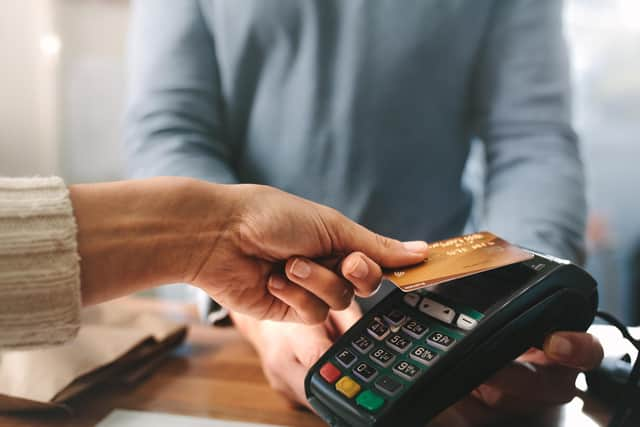Why I'm ditching contactless next year and paying by cash instead - Andrew Vine
It’s going to make budgeting easier because when the notes and coins have gone, that’s it, and save a lot of hassle involved in keeping track of all the contactless payments we’re all encouraged to make these days.
And the more of us who opt for cash instead of contactless in 2023 the better, because with every passing year we’re pushed towards the ghastly prospect of a cashless society by banks and companies more interested in their own convenience than that of their customers.
Advertisement
Hide AdAdvertisement
Hide AdThat’s to be seen in the never-ending closures of bank branches, which cause massive inconvenience for people, and the loss of increasing numbers of cash machines, all of which nudge us towards paying for everything by card.


Shops are guilty of this. I’ve grown fed up of being greeted by sighs or the rolling of eyes from assistants when offering cash to pay for everyday bits and pieces like newspapers or a couple of pints of milk.
I’ve been asked if I can pay by card instead, and when querying this, I was offered that catch-all excuse for rotten customer service everywhere from corner shops to call centres: “It’s because of Covid.”
That one needs laying to rest once and for all. Within months of the pandemic starting in 2020, the Bank of England commissioned a scientific study that concluded the risk of catching Covid from cash was negligible.
Advertisement
Hide AdAdvertisement
Hide AdSoon after, the Government’s own scientists said that transmission of the virus was airborne, which provided further evidence that the new-found horror of handling notes and coins was utter nonsense.
But it has stuck, putting customers in the ridiculous position of being made to feel guilty about paying for their purchases with the legal tender in their pockets and purses.
Cash is due a comeback in 2023, and we should all be helping it along the way, not least because of the cost-of-living crisis. Contactless spending is an alarmingly easy way to empty your bank account, especially since the transaction limit was raised from £45 to £100 because of the unwarranted fears about Covid transmission.
Leading supermarkets, Leeds-based Asda among them, have reported customers at checkouts removing items from their trolleys because the bill comes to more than the amount of cash they have budgeted for, and brought with them.
Advertisement
Hide AdAdvertisement
Hide AdThere’s already plenty of anecdotal evidence like this about those on very tight incomes turning back to cash as a way of keeping track of their spending, and last week saw a long-overdue acknowledgement from banks they need to help people do exactly that.
The founding of the non-for-profit Cash Access UK by the largest banks will see financial hubs opened all over the country to enable people to get cash and carry out face-to-face transactions, with counters run by the Post Office.
Welcome, though this is, it begs the question why the banks concerned have made such a move necessary by shutting more than 1,200 branches over the past couple of years. As if that was not bad enough, they have also made withdrawing money increasingly difficult for many people by removing more than 9,000 cash machines.
Even before the current economic crisis began, the need to ensure people can access cash – and use it to pay for what they need – was clear.
Advertisement
Hide AdAdvertisement
Hide AdIt is less than three years ago that a Government study concluded that eight million people would be unable to access their wages, or manage their budgets, if transactions became card-only or went online. Their only option to avoid the risk of going into debt was to withdraw a cash sum and make it last for a week as best they could.
The number of people in that position will certainly have increased since then, as the costs of food, energy and fuel have soared.
The Government has recognised the problems that a move away from cash represents for millions by saying it will ensure retailers are obliged to accept cash for the foreseeable future.
That’s a laudable aim, but how it could be enforced in the face of shops displaying notices that say “cards only” is unclear.
Advertisement
Hide AdAdvertisement
Hide AdPeople pressure is the key here. Polite insistence on paying in cash will win the day and ensure that banks or retailers who would rather consign notes and coins to history are compelled to realise that the customer is always right.